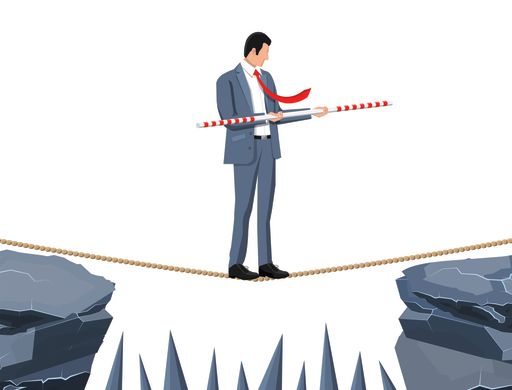How to Thrive in a Crisis
By Dennis Morris, MSW, CEO
*This is an article from the Winter 2020/2021 issue of Contentment Magazine.

Last week a client asked, “How do we emerge from a crisis and reach whole new levels of performance?” That’s a question many of us are thinking about. Can I come out of this a better parent, team member, or partner? How do I do that? A good place to start is to take a look at the attributes of people who do well in a crisis. That gives us an idea of what qualities we need to cultivate. Knowing our signature attributes and how they operate gives us a leg up in handling any crisis.
- Persevere and stay engaged
It’s a big one. Even though things are falling apart, our tenacity or grit is a critical element to stay engaged, search for new coping strategies and unique solutions. We strengthen our fortitude and inspire colleagues by seeing things to the end even if it’s not picture perfect.
- See stressors as opportunities
Those who see the crisis as an opportunity to grow do better in any change event. Challenge yourself. Ask what can I contribute? What can I do to make things better? What’s my purpose? How can I apply my expertise and knowledge? What can I bring to the table to influence the outcomes?
- Execute courage
Courage is the nucleus of how we make decisions, take action, speak our piece, and stand up for our beliefs. Without it we fail to live up to what we know is right. With it, we are true to ourselves. Strengthen your courage in every action. Make sure you stop throughout the day to take a breath and remind yourself of your acts of courage. Each time our courage leads the way we are stronger and clearer about where we are going.
- Show empathy
Empathy is a great attribute. But if you don’t put it into action, who cares? Use practical acts of compassion to let others know you hear them, care about them, and are looking out for their welfare. The wonderful and widely overlooked bonus of empathy is it lowers our own stress. That’s right. You’ll come out ahead if you look out for others.
- Be open to change
If you’re open to change, you’re more receptive to what comes your way. Being open requires vulnerability. It means you can accept you don’t have all the answers. That places you in a stronger position to learn and understand what’s happening, assess how to respond, collaborate, learn from others, and test out new ideas. On the flip side if you’re a closed-door atrophy sets in. You can’t be defensive and a learner at the same time unless you only want to learn what you think. Good luck with that.
- Understand the problem
Whether it’s a family problem, work issue, or a community crisis, understanding the problem in depth helps you prepare and create an action plan. Knowledge gives us insights to assess how we measure up to the task at hand. If you’re looking for a solution there’s no gain in underestimating or overestimating the seriousness of the problem.
- Build on realistic optimism
Realistic optimism is the way to forge ahead. We want leaders and colleagues who recognize we’re in tough times and inspire us, help us see what we can do to turn things around, provide hope and chart a realistic path to a positive endpoint.
- Maintain a sound support system and a balanced life
People who thrive in a crisis are not obsessed with the crisis twenty-four seven. They create time for their family and friends. We need joy, fun, and time with loved ones and supportive communities that nourish our souls. And don’t forget that it’s okay to take a break and turn on Netflix.
- Employ resilience
Resilience means adapting to changing conditions, bouncing back, and recovering from adversity. What could be more important in a crisis? Resilient team members and leaders know how to innovate. They are the ones who keep coming back with fresh perspectives. They have guts. What are you doing to coach for resilience in your organization? How do you cultivate and celebrate resilience? How do you show others you value it? One act of resilience inspires others to develop their resilience.
- Know your abilities
What are my competencies? Knowing them enables you to maximize your best efforts.
- Regulate your emotions
When we are stressed, we may feel testy, sensitive, anxious, or afraid. Keep your feelings in check. Slow down and take note that everyone is stressed. Use your confidants or mentors for support. Don’t go it alone. In a crisis event, we’re on high alert, running full speed ahead, and not in the best position to self-assess. Take stock of your strengths and review them throughout the day. Don’t judge your emotions – manage them.
- Tolerate ambiguity
We are globally interconnected and overloaded with information that arrives at lightning speed. We see technologies becoming obsolete overnight. Life is more unpredictable. Leaders who are good at managing change, handling a variety of inputs at the same time, sorting through information quickly, thinking like entrepreneurs, and reading others accurately excel at managing stress. They are comfortable with uncertainty and have a high tolerance for ambiguity.
- Take action
People who push themselves to take action in a crisis cope better. They develop a game plan, put it in play, assess if it’s working, and decide on the next steps.
- Lead with your principles
When you lead with your principles your colleagues see your commitment to your core values. They’re inspired because they realize you’re driven by a higher sense of calling and not going off in whatever direction the wind blows. Charting a course based on principles builds trust and demonstrates your integrity.
Here’s what I suggest you do next
First, look over the 14 attributes and mark which ones are your five signature strengths. You probably use them all the time. They have served you well. Unfortunately, if they are overused, they can actually get in your way. Let’s say perseverance has been the backbone of your biggest achievements. It could be so high that you sometimes overwhelm everyone in the room. If no one can get a word in edgewise in any meeting with you, why would they want to work with you? How do your signature strengths undermine what you want to achieve? Be honest. What strategies can you use to make sure they don’t overrun you and everyone else?
After you prioritize your top assets, step back and ask yourself which ones do you need to bolster? Then put together a plan on how you will do that. Don’t go overboard. Try working on one attribute a week. Give yourself plenty of breathing room to make a few practical improvements.
If you’re not sure which strengths you need to develop, ask someone you trust to share with you how they would prioritize your 14 attributes? How does their list compare to yours? Use your signature strengths to hear them out and to discover how they see you. Remember that it’s an intentional learning conversation and not a debate. It’s a time to reflect and not deflect. You don’t have to convince them of anything. You only want to see what they see.
Knowing how others experience you can help you figure out how you handle yourself in any situation. Think of it as a gift you can give yourself this holiday season.
ABOUT THE AUTHOR
 Dennis Morris, MSW, CEO of Institute of Respect. As a coach, facilitator, CEO, and founder of the institute of Respect, Dennis helps executives and managers move beyond their own perceived limitations to lead with their principles, increase their self-awareness, and become exceptional leaders who achieve higher-level results. He specializes in working with professionals to escalate their skills by showing them ways to develop genuine, respect-centered connections–connections that clients come to perceive as critical to their long-term success. The services Dennis offers draw on his 30 years of experience as a senior leader, executive coach, psychotherapist, mediator, and educator. But what sets him apart from other consultants is his experience of more than a decade working in behavioral health before becoming a consultant. As vice president of clinical programs, he led a team of psychotherapists serving clients in five counties. In addition, he coordinated and managed consultation and behavioral health services to employees of corporate and government clients including Merck, Heinz, and the U.S. Postal Service. This unique background allows Dennis to help his clients think more creatively and strategically to achieve remarkable results. Dennis can be reached at [email protected].
Dennis Morris, MSW, CEO of Institute of Respect. As a coach, facilitator, CEO, and founder of the institute of Respect, Dennis helps executives and managers move beyond their own perceived limitations to lead with their principles, increase their self-awareness, and become exceptional leaders who achieve higher-level results. He specializes in working with professionals to escalate their skills by showing them ways to develop genuine, respect-centered connections–connections that clients come to perceive as critical to their long-term success. The services Dennis offers draw on his 30 years of experience as a senior leader, executive coach, psychotherapist, mediator, and educator. But what sets him apart from other consultants is his experience of more than a decade working in behavioral health before becoming a consultant. As vice president of clinical programs, he led a team of psychotherapists serving clients in five counties. In addition, he coordinated and managed consultation and behavioral health services to employees of corporate and government clients including Merck, Heinz, and the U.S. Postal Service. This unique background allows Dennis to help his clients think more creatively and strategically to achieve remarkable results. Dennis can be reached at [email protected].
Contentment Magazine
The dictionary defines “content” as being in a state of peaceful happiness. The AIS magazine is called Contentment because we want all of our guests and members to find contentment in their lives by learning about stress management and finding what works best for each them. Stress is unavoidable, and comes in many shapes and sizes that makes being in a state of peaceful happiness seem like a very lofty goal. But happiness is easy to find once you are able to find ways to manage your stress and keep a healthy perspective when going though difficult times in life. You will always have stress, but stress does not always have you!

Leave A Comment
You must be logged in to post a comment.